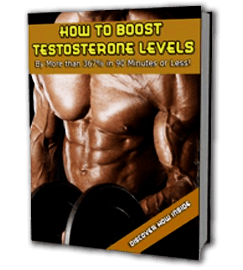(Article Medically Reviewed By Dr. Zach Hyde)
How Dehydration KILLS Test production
I’m sure you remember reading somewhere that our bodies are around 60% water.
However, this is not just a random “fun fact” for you to recite at parties.
It’s valuable information about the delicate balance our bodies must always strive to maintain in order to operate efficiently.
In this article, we’re going to discuss how failing to keep your body properly hydrated can affect your testosterone levels, your sex drive and your quality of life.

Hydration and Testosterone (The Link)
Over the years, we’ve recommended countless supplements, dietary changes, exercises, and more that are specifically designed to maintain or raise your testosterone production.
However, if you take all that advice and allow yourself to remain in a constant state of dehydration, you might as well throw your time, food, and money out the window.
You see, studies show that the vast majority of us don’t get enough water throughout the day.
To make matters worse, our tendency to indulge in salty foods, alcohol, and other hydration-sapping substances often removes what precious little H2O we do put into our bodies.
As a wise doctor once told me: if your urine isn’t damn near clear, you’re dehydrated.
But why is this such a big deal?
Because dehydration (even by as little as 1% to 2% of your overall body mass) can drastically raise the levels of cortisol in your body.
If you remember, cortisol has a seesaw relationship with testosterone. When one goes up, the other goes down, and vice versa.
Dehydration and Exercise
This is complicated by the fact that many men – particularly those that are seeking to raise their T levels via hard exercise and lean muscle development – are frequently dehydrated after working out.
In fact, various studies show that this post-exercise dehydration could not come at a worse time for your hormones, cells, and ability to nip that rising cortisol in the bud.
Take this study from 2008.
In it, the subjects were asked to complete three resistance training circuits in different states of hydration.
The researchers then checked the hormones of each subject while at rest, during the training, immediately afterward, and one hour after the exercise.
The results showed that increased levels of dehydration spiked cortisol levels significantly, largely mitigating the surge of testosterone often accompanying high impact exercise.
What’s worse is that HGH (human growth hormone) production was also suppressed, which can limit the gains made during the routines.
Hydration and Testosterone (The Solution)
Living in developed countries with unlimited access to pure, clean water can leave you taking this readily available H2O for granted.
Because what comes easy is usually under appreciated. But this is a big mistake.
Because testosterone production aside, hydration is key to more bodily processes than you can possibly imagine.
It helps us burn calories more efficiently…
Which allows us to better utilize aminos and fatty acids, which increases our cognitive abilities and elevates our mood and overall sense of well being.
Water also keeps your joints lubricated, hydrates your skin, regulates blood pressure, flushes waste out of your body and keeps your kidneys functioning properly
To that point, “thirst” isn’t just a feeling you get – it’s a warning sign from your body that it might not be able to operate at full capacity.
Moreover, when you do feel thirsty, you should remember that your body is already in a state of dehydration.
So if you’re feeling “thirsty” at the gym, you can rest assured that your cortisol levels are already on the rise.
To make matters worse, men are more likely to become dehydrated from exercise than women.
This goes doubly for men over 40, who may expend more energy (and sweat) during hard workouts than their younger counterparts.
Dehydration and Testosterone Final Tips
Does this mean that they should reach for one of those supersized Powerade drinks loaded down with high fructose corn syrup?
Nope.
If you want to hydrate your body in a way that restores its natural balance and keeps your cortisol levels at bay, you want plain, simple water.
That said, you can’t just get it from any source. For instance, plastic water bottles (permanent or disposable) can leak xenoestrogens into everything you drink.
This will, again, put your T levels at risk.
Instead, find a clean, high quality water source that has the chlorine, heavy metals, trace pharmaceuticals and other impurities filtered out.
A good home purification system will get the job done, but they aren’t cheap. Sparkletts and other home water delivery companies will also work.
Another option is the water vending machines found in front of many grocery stores these days.
Quality varies, so look for companies that incorporate Reverse Osmosis, along with filtration and purification components.
And finally, make sure you store this water in a glass or BPA free plastic container, both of which can be found on amazon.


